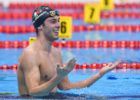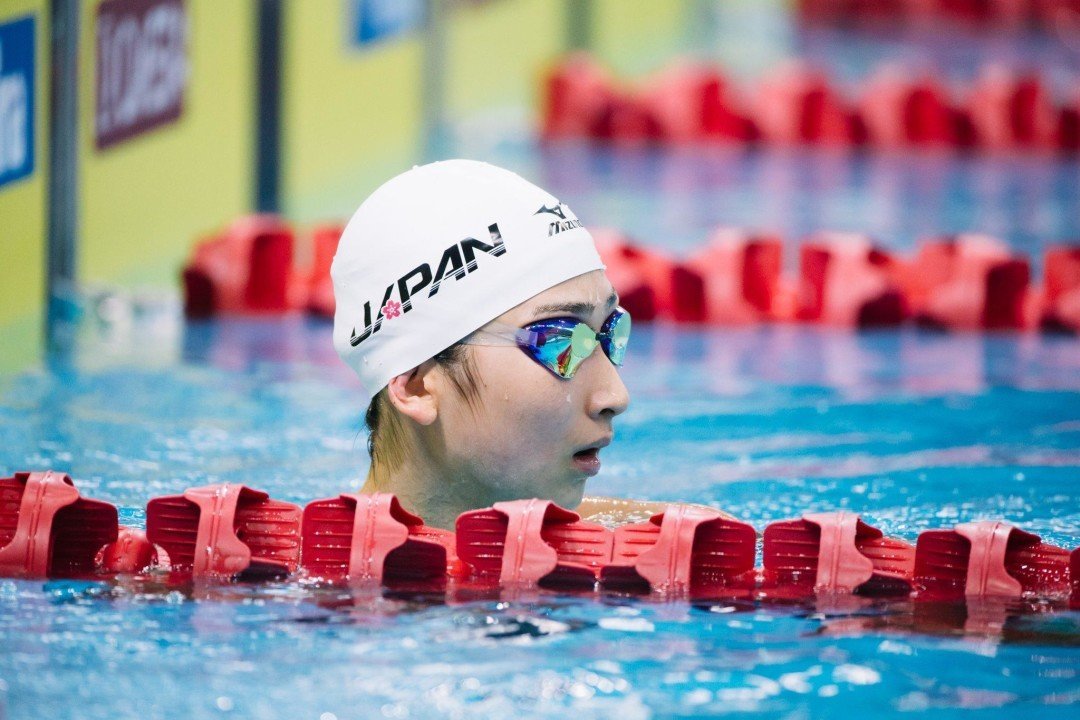
2016 JAPAN SWIM (JAPANESE OLYMPIC TRIALS)
- Monday, April 4th – Sunday, April 10th
- Tokyo Tatsumi International Swimming Center
- Prelims at 10am local/9pm EDT previous night; Finals at 6:30pm local/5:30am EDT
- Japanese Olympic Qualifying Times (Japanese)
- Psych Sheets (Japanese)
- Live Stream (Prelims)
- Results
MEN’S 1500 FREESTYLE – FINAL
- Japanese National Record – 14:54.80, Kohei Yamamoto (2014)
- JPN OLY Standard – 14:55.30
- The Podium –
- Kohei Yamamoto, 14:57.12
- Ayatsugu Hirai, 15:02.25
- Atsuya Yoshida, 15:10.41
Leading the field tonight in the longest men’s event was Japanese National Record Holder Kohei Yamamoto. The 24-year-old stopped the clock at 14:57.12 to earn the gold in the only sub-15-minute mark of the field, less than 3 seconds off of his own record he set in 2014.
With his performance in Tokyo tonight, Yamamoto now ranks as the 5th-fastest man in the world this season. Yet, even with this impressive outing that would have placed 5th overall at last year’s FINA World Championships, Yamamoto missed the Japanese Olympic-qualifying standard of 14:55.30. As such, unless a subjective decision is made by the Japanese Swimming Federation, Yamamoto will not be contesting this men’s 1500m freestyle event in Rio.
2015-2016 LCM Men 1500 Free
PALTRINIERI
14.34.04
| 2 | Connor JAEGER | USA | 14.39.48 | 08/13 |
| 3 | Mack HORTON | AUS | 14.39.54 | 04/14 |
| 4 | Gabriele DETTI | ITA | 14.40.86 | 08/13 |
| 5 | Jordan WILIMOVSKY | USA | 14.45.03 | 08/13 |
MEN’S 50 FREESTYLE – FINAL
- Japanese National Record – 21.88, Shinri Shioura (2014)
- JPN OLY Standard – 21.87
- The Podium –
- Katsumi Nakamura, 22.09
- Shinri Shioura, 22.14
- Kenta Ito, 22.46
The sad story of having no Olympic qualifiers in an event continued into the men’s splash n’ dash, as no competitor tonight was able to cut a time beneath the 22 second threshold. With the Japanese Olympic standard of 21.87 sitting as an even faster mark than the Japanese National Record (21.88), anything short of a monster swim wouldn’t make it to Brazil.
Such was the case with Katsumi Nakamura, who doubled up on his earlier 100m freestyle win by taking the 50m freestyle as well. Nakamura clinched gold in 22.09, but was well off the aforementioned necessary mark to make it to Rio. The situation was the same in Nakamura’s 100m freestyle as well, where, despite earning a new National Record 48.25, he was short of the stricter Japanese-dictated OLY standard of 48.16.
Also missing the mark was the Japanese National Record Holder in this event, Shinri Shioura. Altough his 22.14 outing was swift enough for 2nd place, it wasn’t sub-22 or even near the qualifying standard, so Shioura will be left off the roster.
Barring any subjective decision by the Japanese Swimming Federation, despite proving that they are slowly but surely making a move towards being internationally competitive sprinting-wise, the Japanese men will be without any freestyle sprinters at the 2016 Olympic Games.
WOMEN’S 50 FREESTYLE – FINAL
- Japanese National Record – 24.74, Rikako Ikee (2016)
- JPN OLY Standard – 24.59
- The Podium –
- Rikako Ike, 24.76
- Miki Uchida, 25.19
- Yayoi Matsumoto, 25.53
The night brightened up a bit in the form of 15-year-old Rikako Ikee. On top of already having won the women’s 100m butterfly in a Rio-qualifying time and also earning silver in the 100m freestyle, Ikee topped off her trio of appearances with a win in this splash n’ dash event.
Ikee owns the World Junior Record in this event with the 24.74 she clocked just this past February at the Konami Open, and the teenager came within just .02 of a second of that mark tonight. Ikee charged to the wall in a time of 24.76, a time which sits right behind her WJR as the 14th-fastest in the world this season.
The women’s 100m freestyle gold medalist here in Tokyo, Miki Uchida, wrangled in a mark of 25.19, while Yayoi Matsumoto stopped the clock at 25.53 for bronze. As such, Ikee was the only female to venture into 24-second territory in the final.
As with the previous 2 events of tonight’s session, the winner fell short of the nation’s Olympic-qualifying standard and, therefore, does not automatically punch a ticket to the Games. In this case, despite being just .02 of a second off of her own National Record and WJR, Ikee wasn’t able to obtain the 24.59 Japanese OLY standard.
MEN’S 100 BUTTERFLY – FINAL
- Japanese National Record – 51.00, Kohei Kawamoto (2009)
- JPN OLY Standard – 51.64
- The Podium –
- Takurou Fujii, 52.03
- Takeshi Kawamoto, 52.36
- Takaya Yasue, 52.43
Not improving on the Rio-less night was the fact that tonight’s 100m butterfly gold medalist didn’t delve into 51-second territory. Takurou Fujii touched the wall in 52.03 to stand atop the podium, but watch his Rio opportunity pass by, as the Japanese Olympic-qualifying standard is positioned at a swift 51.64.
Takeshi Kawamoto dropped a couple of tenths off his semi mark to earn a silver in a time of 52.36 tonight, followed by countrymate Takaya Yasue who improved from 5th after semi’s to bronze with his mark of 52.43.
WOMEN’S 200 BACKSTROKE – FINAL
- Japanese National Record – 2:07.13, Reiko Nakamura (2008)
- JPN OLY Standard – 2:08.76
- The Podium –
- Natsumi Sakai, 2:10.43
- Yuka Kawayoke, 2:10.71
- Mayuko Gotou, 2:10.91
Unfortunately for Japanese swimming fans, the athletes ended the night with an 0 for 5 record in terms of earning Olympic roster berths. As predicted by the looks of the prelims and then semi’s, the Japanese women continued to have a hard time breaking through the 2:10 barrier in this event, let alone come close to the Olympic-qualifying standard of 2:08.76 needed to represent Japan in Rio.
Natsumi Sakai added .43 of a second to her 2:10.00 semi time to register a 2:10.43 for the gold, well short of the 2:08.76 Rio-qualifying standard. The runner-up, Yuka Kawayoke, also added time to her 2:10.48 semi outing, touching in 2:10.71 for silver.
The story was the same for tonight’s bronze medalist, Mayuko Gotou, whose time of 2:10.91 added almost 4 tenths to her morning semi of 2:10.53.
With the rest of the world collecting times in the 2:07/2:08 range with relative ease, paired with the fact that no Japanese woman dropped under a minute in the 100m sprint back event, the backstroke discipline is an area the Japanese must improve upon to keep up with the rest of the globe both individually and within a medley relay capacity.

I have seen better from japan at their selection meet in the past. And they tend to swim a little slower in the summer which for them would be worrying. Surprised that big stars like waranabe, irie and seto looked far from their best. Their main hopes are on hagino (who is smartly dropping a few events) and rising star kaneto. Ikee is in very competive events and probably will be hard to medal but has a great future. Also surprised that japan struggled to qualify swimmers in events they have always excelled like women’s backstroke and men’s fly. This looks increasing like a us vs Australia duel meet with a sprinkling of a few stars from around the world… Read more »
All these ridiculous Olympic standard requirements (significantly lower than the “A” cuts) are turning our sport into a venture of frustration. Track and field doesn’t have these rules. I don’t know of any other sport that does. What gives?
Yes, Swimswam needs a Japanese speaking fan or insider (equivalent of Bobo for France) who can give us the skinny from the the Japanese sites and the press. I assumed the French federation posted unreal and aspirational Oly cuts so they could infuse political control over team composition, but in the end, a team was selected (largely) ex post facto. Kitajima’s retirement after a 59.6 in the semi’s suggests to me that the Japanese federation has indeed established HARD cuts and will not name additional qualifiers after-the-fact. If so, they will have an incomplete and small team with no opportunity for improvement (if they don’t show up) in Rio. What is up with these tough National cuts? Why do the… Read more »
Swim swam, you really need to hire a Japanese reporter. Other than reporting results and commenting on them there has been no insight into the Japanese team or federation or what anyone there is actually saying and thinking , no translation of interviews or Japan swim media stories that I have seen at least. Anyone can read results but they are just results.
@Hank, I appreciate the coverage SwimSwam is doing on the Japanese Trials and all these Olympic qualifying meets across the world. To say they need to go hire a Japanese reporter is a little short sited as they are a business and it would be impossible for a small company like theirs to have a Japanese, Chinese, French, German, Hungarian, Portuguese, Arabic, etc. (insert 10 other languages/countries) reporter and coverage in the native language right away even though it may be the SwimSwam’s goal in the long-term to provide that coverage. There is a real cost for what you are asking and I am sure their staff is always open to interested in people who want to contribute in this… Read more »
Looks like Ikee is a huge star in Japan. I’ve seen her in a lot of youtube videos of Japanese TV shows.
https://www.youtube.com/watch?v=J23bzQGPVJQ
For swimswam readers who understand Japanese.
Kitajima announces his retirement.
https://www.youtube.com/watch?v=YeoM9-1HRtA
Men’s 100 fly final
https://www.youtube.com/watch?v=GFtXAIR6MOo
Men’s 50 free final
https://www.youtube.com/watch?v=bm7YnoGhN4Y